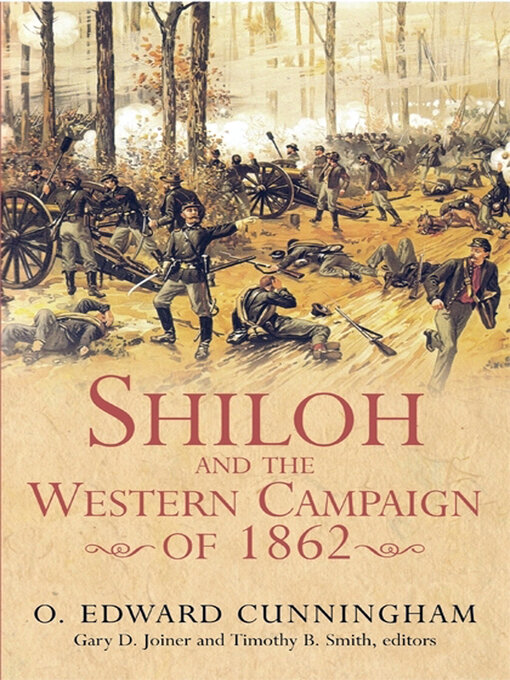- New eBook additions
- All About Education
- Cozy ebooks for Fall
- Made in West Virginia
- A Shore Thing
- First in the series
- Strange New Worlds
- Worlds of Fantasy
- Most popular
- Available now
- Try something different
- Just Plain Good
- See all ebooks collections
1 of 1 copy available
1 of 1 copy available
The bloody and decisive two-day battle of Shiloh on April 6-7, 1862 changed the entire course of the American Civil War. The stunning Northern victory thrust Union commander Ulysses S. Grant into the national spotlight, claimed the life of Confederate commander Albert S. Johnston, and forever buried the notion that the Civil War would be a short conflict.
The conflagration had its roots in the strong Union advance during the winter of 1861-1862 that resulted in the capture of Forts Henry and Donelson in Tennessee. The offensive collapsed General Johnston's advanced line in Kentucky and forced him to withdraw all the way to northern Mississippi. Anxious to attack the enemy, Johnston began concentrating Southern forces at Corinth, a major railroad center just below the Tennessee border. His bold plan called for his Army of the Mississippi to march north and destroy General Grant's Army of the Tennessee before it could link up with another Union army on the way to join him.
On the morning of April 6, Johnston boasted to his subordinates, "Tonight we will water our horses in the Tennessee!" They nearly did so. Johnston's sweeping attack hit the unsuspecting Federal camps at Pittsburg Landing and routed the enemy from position after position as they fell back toward the Tennessee River. Johnston's death in the Peach Orchard, however, coupled with stubborn Federal resistance, widespread confusion, and Grant's dogged determination to hold the field, saved the Union army from destruction. The arrival of General Don C. Buell's reinforcements that night turned the tide of battle. The next day, Grant seized the initiative and attacked, driving the Confederates from the field. Shiloh was one of the bloodiest battles of the entire war, with nearly 24,000 killed, wounded, and missing.
Edward Cunningham, a young Ph.D. candidate, researched and wrote Shiloh and the Western Campaign of 1862 in 1966. Though it remained unpublished, many Shiloh experts and park rangers consider it the best overall examination of the battle ever written. Indeed, Shiloh historiography is just now catching up with Cunningham, who was decades ahead of modern scholarship. Now, Western Civil War historians Gary Joiner and Timothy Smith have resurrected this beautifully written, deeply researched manuscript from undeserved obscurity. Fully edited and richly annotated with updated citations and observations, original maps, and a complete order of battle and table of losses, it represents battle history at its finest.
-
Creators
-
Publisher
-
Release date
May 20, 2022 -
Formats
-
Kindle Book
-
OverDrive Read
- ISBN: 9781611210231
-
EPUB ebook
- ISBN: 9781611210231
- File size: 4769 KB
-
-
Languages
- English
Formats
- Kindle Book
- OverDrive Read
- EPUB ebook
subjects
Languages
- English
Loading
Why is availability limited?
×Availability can change throughout the month based on the library's budget. You can still place a hold on the title, and your hold will be automatically filled as soon as the title is available again.
The Kindle Book format for this title is not supported on:
×Read-along ebook
×The OverDrive Read format of this ebook has professional narration that plays while you read in your browser. Learn more here.
